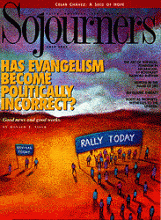Arrested Development is old news in MTV Standard Time. But good music has shelf life, even if its accompanying video is no longer in heavy rotation. Fittingly, Arrested Development's work is for the long haul: It sinks deep roots into cultural (and musical) history, spins out new forms, and names the future as worth working for.
Unlike many innovators, Arrested Development has received commercial recognition for their sound. Their widely praised debut album, 3 Years, 5 Months and 2 Days in the Life of..., released last year, sold more than 1.5 million copies as of January 1993. They were named Musician magazine's 1992 Band of the Year. The group won two Grammys. All this, despite--or maybe because of--lyrics that name themes American culture variously romanticizes or squelches (and therefore all too rarely realizes): Honest spiritual searching. Political dissent. Racial and gender equity. The living power of history and memory.
Arrested Development is generally tagged as rap, but they blend hip hop, blues, rock, reggae, soul, and funk. Several of their songs move with a country-paced lope rather than urban punch and pop. In their first single, "Tennessee," rapper Speech is led by family grief and spiritual longing to make a pilgrimage to the rural South to "walk the roads my forefathers walked," while backup singer Aerle Taree clamors for a game of horseshoe.
The "deep in the country" theme is emphasized in a stage setup that includes patchwork sheets hanging on clotheslines and rusty hubcaps; their album cover shows the band standing in an open field. This hearkening to plowed earth as much as concrete and steel has led Arrested Development's work to be described as rural rap.
Read the Full Article

